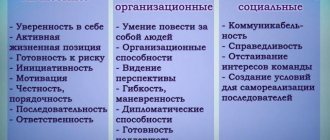Strengths and weaknesses of a person
The strengths and weaknesses of a person are closely related and should not contradict each other. Each person has their own disadvantages and advantages. As a rule, we are used to talking about strengths, but we are often silent about weaknesses.
An independent, goal-oriented and self-critical person always recognizes that there are many weaknesses in his character. And there's nothing wrong with that. We are all humans. But every purposeful person can turn his shortcomings into advantages through painstaking work on himself.
So, what are a person's strengths and how to find them? To do this, first of all, pay attention to your talents and skills. This is where you will find your strengths. When you have found your advantages, pursue them and develop them. This will allow you to open up to your fullest potential.
If you cannot independently determine your strengths for the questionnaire, ask your acquaintances and friends for help. Thanks to their opinions, you may discover advantages in yourself that you were not aware of before. And in some ways your opinion will agree with the opinion of your friends.
In addition to the strengths on your resume, there is often a question about your weaknesses. There is no need to be ashamed of them. If you claim that you have no negative character traits, this will become a sign to the recruiter of an undeveloped personality. Which is unlikely to help you get the desired position in the future.
Table 1 - Strengths and weaknesses
| Your strengths if you: | Your weaknesses may include: |
| Results-oriented | Inability to remain silent in time |
| Tenacious | Excessive emotionality |
| Hardworking | Lack of willpower |
| Strong-willed personality | Shyness |
| Confident | Inability to speak in public |
| Sociable | Excessive irritability and aggressiveness |
| Organized and independent person | Inability to say “no” |
| You perceive information well | Formalism |
| Learn quickly | Hyperactivity |
| Responsible for their own actions and the actions of their subordinates | Fear of traveling by air and sea |
| Disciplined | Inability to lie |
| Love your profession and work | Integrity |
| Active and energetic person | Lack of flexibility |
| Patient | Modesty |
| Honest and don’t like to lie | Excessive self-criticism |
| You have organizational skills | Straightforwardness |
| Have a creative mind | Love for formalism |
| Punctual | Pedantry |
| Are you a good performer? | Self-love |
| Scrupulous | Impulsiveness |
# Advantages of your candidacy - what to write in the application form
A resume is an official document, often has a standard form and the same filling structure. Considering 50 applications for one position, the recruiter tries to choose a candidate who has at least the slightest advantage. Anyone who stands out positively among other applicants will get a chance to take a vacant job.
According to a study of the requirements that companies place on vacancies, most employers want to see the following positive aspects in applicants’ resumes:
# How to identify positive traits
Expert opinion
Ekaterina Troitskaya
HR manager
Ask a Question
Self-critical, goal-oriented and independent people always recognize the presence of weaknesses in their character. And this is absolutely normal, because there are no ideal people. But many successful people are able to turn their negative traits into advantages by working hard on themselves.
The personality of each person is made up of strengths and weaknesses, which are closely dependent on each other. We try to show off useful features, but try to keep silent about flaws.
Example: in college you were always uncomfortable speaking in front of a large audience. But the thesis was completed independently and on time. This means that, despite your shyness or fear of public speaking, you can safely talk about perseverance, attentiveness, responsibility and hard work.
For those who are writing a resume for the first time, it is difficult to highlight the advantages. And once at the interview, the applicant begins to worry and demonstrate completely opposite characteristics. To avoid unpleasant moments, the applicant must analyze his character in detail:
- Start with talents and skills. Among them you will definitely find worthy qualities. Think about what you do poorly and what comes easy. In order not to forget anything, it is better to write it down on a piece of paper. Knowing your advantages, you will understand the direction of work to develop them.
- When it is difficult for applicants to single out the positive aspects on their own, friends and acquaintances - people who closely communicate with you - will come to the rescue. Listen to their opinion and advantages will open up before you, the existence of which someone had no idea, and someone needed to confirm their position and enlist support.
- Evaluate the people who surround you. Think about which traits help them in their work and which ones prevent them from moving up the career ladder. Compare which qualities you have. Highlight those that are considered strengths, and then highlight those that could be considered weaknesses.
Divide a sheet of paper into two columns. First, select the personal qualities that are most suitable for the vacancy. In the other - shortcomings that will least affect the work. Ready! But there should be fewer disadvantages than advantages, and all character traits should correspond to your personality.
# Relationship between character and vacancy
Most job seekers make the same mistake: they send the same resume to different vacancies. You shouldn’t do this, since each manager sees in his own way what skills and qualities will be required for the vacancy. It is important to be able to predict what kind of person management wants. You can find out if you read in detail the advertisement that the company publishes when looking for an employee.
Don't be fooled! For example: calm and reasonable people do not have leadership qualities. And if you cannot meet strict deadlines, do not write that you are in cahoots with discipline and punctuality.
Some positions require a person to have emotional balance under extreme working conditions, others require the ability of people to work independently, without waiting for instructions from management.
Some employers value honesty in a candidate, others the ability to make a bright and informative presentation, while others are interested in the ability to communicate with foreign partners or know business etiquette.
Expert opinion
Nikolay Borozdin
Director of a recruitment agency
Ask a Question
Each position corresponds to a certain set of qualities: an accountant is characterized by patience and perseverance, a driver is characterized by composure and attentiveness, and activity and leadership skills are valued in a manager. Always compare the position and the character that suits it.
# How to stand out from other candidates
Try to find two features that will be especially useful in your future work and wrap them in a tasty wrapper. This formulation will tell you much more about you than a banal list of words that do not confirm anything.
The majority of applicants write the same thing on their resumes:
- Performance or responsibility
- learning ability or stress resistance,
- communication skills or determination,
- results-oriented or teamwork.
The above qualities cannot be considered strengths, since almost every applicant has them. There are no specialists who are able to admit their irresponsibility and inability to focus their activities on results. These virtues should be present in a person as a matter of course.
To outperform other candidates when describing your strengths, make them unique and break away from the template.
To be different from others, write differently:
- Remove all boilerplate words from your resume.
- Choose a couple of the most important advantages and comment in one sentence.
Example: creative (I always find and implement original ideas even for the most ordinary tasks).
Example: sociable (I find an approach even to children from disadvantaged families with a wounded psyche).
Example: punctual (I always and everywhere meet deadlines, complete assignments and submit reports, far ahead of others).
Exceptions to the rules
When applying for a job, indicate in your resume those strengths that will help you get the desired position. After all, some of your strengths for a certain position may turn out to be weaknesses that an applicant should not have.
Here are the most common examples. To get a manager position, you shouldn’t talk about your ability to sing. This is unlikely to help you get a job. But if you tell a hiring manager that you are a good cook, this will indicate your discipline, creativity, perseverance and accuracy. After all, to prepare a new dish you need to spend a lot of effort and time on choosing products and on the direct cooking process. In addition, a good cook is always creative in creating a new masterpiece, but always follows it exactly in accordance with the culinary recipe.
Below we will give several examples of what qualities must be specified when applying for a particular position.
Table 2 - Strengths and weaknesses by specialty: examples
| Strengths | Weak sides |
| If you are applying for the position of accountant, then you: | |
| Assiduous | You don't know how to lie |
| Attentive to details | Always straightforward |
| Disciplined | Scrupulous |
| Punctual | Principled |
| Hardworking | Distrustful |
| Honest and decent person | Modest |
| If you are applying for a leadership position, you: | |
| Initiative | Hyperactive |
| Active | A person with high demands |
| Goal oriented | Scrupulous |
| Assertive | Principled |
| Have leadership qualities | Pedantic |
| Love to develop and learn new things | |
| Confident | |
| If you are an applicant for creative vacancies, you: | |
| Have a creative mind | Hyperactive |
| You know how to work for results | Modest |
| You know how to soberly evaluate your work | Emotional |
| Initiative | |
| If you are applying for a manager or office employee position, you: | |
| Sociable | Are you afraid of flying? |
| Results-oriented | You don't know how to lie |
| Can you listen? | Principled |
| Confident | Hyperactive |
| Speak competently | |
| Punctual | |
| You know how to find a way out of difficult situations | |
| Attentive and polite | |
| Responsive | |
| Have a creative mind | |
The table shows that not all positive aspects should be indicated in a resume, since some are simply not needed to obtain the desired position or can be “harmful.” For an employment application, we recommend that you select such weaknesses that will help characterize you as a responsible person and worthy of holding this position. The negative qualities of your character should help you perform the functions assigned to you.
What strengths to mention during an interview?
During the interview, it is likely that the HR person will ask you to describe your strengths. Many candidates often wonder how to answer this question without over-praising themselves and seeming like a narcissist. Your goal here is to deliver an answer with a high degree of self-awareness and professionalism.
It is important to be prepared for this question and have a well-researched answer with you. Even if you don't get asked this question, you will be aware of your strengths and what you can bring to the position. This will help you clearly convey your strengths when answering other interview questions about examples of your work and other work situations.
If you're willing to tell a story when answering a strengths question, it will help you stand out from other job candidates. Instead of simply saying, “I'm detail-oriented and hard-working,” or simply listing your strengths, you can come up with a compelling way to tell your story by highlighting what you can bring to the position you're applying for.
When it comes time to answer this question, you need to be very specific. Assess what you consider your strengths, or ask a friend/colleague to help you identify what you are good at. Make sure you include a range of strengths, including learning abilities, professional skills and personal qualities, so you can demonstrate your versatility.
Even the most experienced candidates have trouble answering questions about their strengths, so we've put together a list of examples to help you craft your story. You can use advice from each of these examples to ensure your story reaches your full potential and wows the hiring manager.
What else should you pay attention to in your application or resume?
During the interview, we recommend that you also indicate “general” strengths.
- Be sure to indicate in your resume that you always set goals for yourself and achieve them, that is, you are a goal-oriented person. At the same time, you show persistence and always follow the pre-drawn plan.
- It is also worth pointing out that if unforeseen circumstances arise, you will be able to find a way out of the current situation - you have creative thinking.
- Another important component of any successful applicant is self-confidence. This will characterize you as a confident person who is not afraid to take a step forward. You are not inclined to panic due to unforeseen circumstances; you are calm and confident in your abilities.
- The ability to communicate with people is also very important. Let it be clients, colleagues, subordinates, suppliers. You just need to be able to find a “common language” with them, accept their point of view and correctly present your opinion.
- Another positive character trait that must be indicated in the employment application is responsibility. Whatever position you apply for, you must always be responsible for your actions. Otherwise, you will become a burden to the company, which will ultimately lead to your termination.
Also, when applying for a new position, indicate that you are highly trainable. You can give examples from your past work or university practice. When you come to a new company, at first you will need to study: learn about the company, the features of its activities and learn how to fulfill your direct responsibilities.
Negative aspects of a resume
17 Jan 2020 Recruiters often ask candidates to list their weaknesses. The purpose of this question is for the HR specialist to understand how self-critical the potential employee is, whether he evaluates himself correctly and whether he is able to perceive criticism. The applicant can independently indicate his negative aspects in the resume, however, not forgetting to emphasize his skills and abilities. In this article we will tell you how to correctly present your negative qualities in your resume and give clear examples, but first things first. First, consider the basic rules for filling out the section on shortcomings.
If an employer sends you an email or asks you to fill out a resume form from the company before a meeting, then most likely there will be a question about your weaknesses. Under no circumstances should you put a dash. If this section is present in the application form, then the employer is definitely interested in this item. A dash in this case will be regarded as an inability to soberly evaluate oneself and inflated self-esteem.
Also, don’t get too carried away when filling out this section. Remember that disadvantages can become your advantages. For example, being unsociable for an accountant is undoubtedly a plus. But for a sales manager it’s obviously a minus.
Remember that what is being assessed is your adequacy, self-criticism and truthfulness, and not how many shortcomings you have.
Examples of undesirable personal qualities in a resume - shortcomings that are definitely not worth mentioning
- I'm often late;
- I am fond of gambling;
- Having bad habits (alcohol, smoking, etc.);
- I am often distracted;
- I work only for the salary;
- I like to have office romances;
- I'm lazy;
- I'm greedy;
- Hot-tempered;
- Passive;
- Envious;
- Careless;
- I often feel indifference to what is happening around me; I like to live in my own world.
Disadvantages that may not work in your favor:
- Pedantry;
- Individualism;
- Self-criticism;
- Self-esteem;
- Hyper-reactivity;
- Modesty;
- Mistrust;
- Conceit;
- Straightforwardness;
- Vanity;
- Self-confidence;
- Excessive demands;
- Painstaking.
Before pointing out any shortcomings, read the requirements in the vacancy and draw up an approximate portrait of an ideal employee. After that, highlight character traits that will not hinder you or will help you in your future work.
Good weaknesses for a resume:
- Inability to respond to rudeness with rudeness;
- Increased demands on others;
- The tendency to make decisions based on one’s own opinion;
- Reluctance to act to please others;
- I can’t always express my thoughts accurately;
- Prone to reflection;
- I trust people, sometimes too much;
- I spend a lot of time evaluating my actions and actions;
- I can get carried away with work and forget about a break;
- I pass all situations through myself;
- I don't know how to swear;
- I can't lie.
Neutral qualities:
- Fear of insects, snakes, mice and other living creatures;
- Fear of airplanes;
- Lack of work experience (for those starting a career or changing fields of activity);
- Age (for people over 40 years old);
- Love to shop.
The list of negative qualities of a person in a resume should not contradict your line of work or call into question your professionalism.
So, for example, to get a job as a sales consultant, you can indicate:
- reliability (is a plus when working with clients);
- excessive scrupulousness (will be a plus when working with money);
- an inflated sense of responsibility (as a rule, sellers are financially responsible for the product, and this “flaw” is simply necessary for a good salesperson);
- excessive love of communication (an important point in working with clients, which is also a positive “disadvantage” for retail.)
Negative qualities for an accountant may be the following:
- Distrust of people and love of facts (or rather, numbers);
- Discharge from disorder (everything should be in its place and that’s the only way);
- Slowness (when working with large sums there is definitely no need to rush);
- Excessive attention to detail or pedantry.
Recommendations
You know, interviews are usually conducted by people who know how to identify a person’s strengths and weaknesses. Examples constantly pass before their eyes. Involuntarily, you will learn to notice the subtleties and nuances of behavior and project them onto characters. When you come across such a form, fill it out and read what you write twice. It is necessary to take a look at your data as if from the outside. You have two lists. Look at the list ratio. It is desirable that there be three times more positive, strong qualities than weak ones. Judge for yourself, who needs a worker who can’t do anything and doesn’t want to? It is foolish to give such an individual a chance to grow. And what do you think?
What weaknesses should not be indicated in questionnaires?
Whether you're filling out an application or going through an interview, there are a number of weaknesses that shouldn't be talked about. Even if you have such shortcomings, it is better to lie. Otherwise, your chance to get a job will be lost. For convenience, I will list them and give small explanations.
- Laziness
. As a personnel officer, I will immediately reject such a person. In our fast world, employers are not interested in passive lazy people. They take only those applicants whose eyes sparkle and have a real desire to work.
- Inability to communicate
. Communication is everything to us. In serious positions, a person without this skill is absolutely useless. He will not be able to work in a team, give presentations, set tasks, and much more. - Irresponsibility
. Think for yourself, would you hire an irresponsible person? Of course no. There are many worthy people looking for work and there is always a choice. - Inefficiency
. There are a number of people who constantly fuss and do something, but do not bring any results. Today's employer can take an arrogant and rude person and forgive him these shortcomings if he is effective. He will not accept a useless person into his ranks. - Liar
. Working for a reputable organization means being honest and fulfilling your obligations in good faith. Lying is definitely unacceptable and hiring a person who will lie in some matters does not make any sense.
So, I have named the most important things that will help you pass the interview successfully. The advantages and disadvantages listed below are universal and suitable for any profession. Remember the most important ones (the top ones) and you will definitely achieve what you want.
Strengths
By analogy, you can praise yourself in a questionnaire. Indicate all your talents, abilities, skills, experience. Eg:
- strength of will;
- endurance;
- durability;
- leadership skills;
- determination;
- calm;
- organization;
- clarity of mind;
- determination;
- communication skills;
- initiative;
- patience;
- love of truth;
- justice;
- thrift;
- business abilities;
- financial skills;
- tolerance;
- spirituality;
- analytics;
- ability to compromise;
- artistry;
- accuracy;
- respectful attitude towards leaders.
The list is also very approximate. It will be easier to correct it if they explain to you what you will need to do at work. Be sure to inquire. And from the responsibilities, highlight the skills that are necessary for their successful implementation.
Techniques for neutralizing objectively vulnerable points in a resume
- Any flaw found in an applicant’s application form can ruin hopes for employment in a given company. Therefore, in such cases, it is especially important to duplicate the resume with a cover letter - an additional document that is attached to the main one and reviewed first. Moreover, in many large corporations, especially subsidiaries of foreign companies, the presence of a preliminary message is mandatory. The accompanying message is sent by mail or fax before the resume, and in the electronic version it is inserted into the body of the letter and contains a link to the attached file. This is an excellent way to “catch” the employer’s attention, an attempt in absentia to build a more trusting relationship and highlight your advantages. When the recipient proceeds to review the resume, a favorable beginning of contact with the “problematic” applicant will help smooth out the “sharp corners” in the main presentation. It is important that the applicant for the position must pay close attention to drafting a competent, logical, and easy-to-read cover letter text. Here are a number of recommendations that will help when working on such an appeal:
- the letter should be concise, contain no more than 10 sentences, 3–5 paragraphs, occupy a volume of 1000–1500 printed characters (about ½ A4 sheet);
- clear organization of information will allow the employer to quickly read the message without spending a lot of time. Structure:
What goals should you include in your resume?
– greeting and addressing the head of the organization/vacancy supervisor (preferably by name or using neutral “Dear Sirs!”, “Good afternoon!”, “Hello, ...!”);
– selection of the main block;
– polite farewell (“With respect, …”, “With respect and hope for further cooperation, …”);
– the final part indicating contact information;
- use a business style, excluding humor, familiarity, colloquial and slang words, and phrases. The formal tone and emotionality of the letter will soften constructions with an address and farewell, an expression of readiness to come for an interview and a desire to receive feedback. The phrases “I would be sincerely glad if you consider my candidacy suitable for this position”, “I look forward to your call”, “Thank you for paying attention to my resume” will sufficiently enliven the strict language of a business message, personalize the letter and create a living image of the sender;
- An example of the main block of a cover message that can be taken as a model for a doubting applicant:
“After working as an accountant for about 20 years, I decided to return to my old dream and take up photography professionally. Having taken courses in photography (I have attached a certificate) and refreshed the knowledge I acquired in the school club and during my student passion for photography, I began to have a good understanding of today’s trends and trends in photography, studied modern equipment and met many interesting figures in the Moscow photography community. Having independently figured out graphic editors (list), I got the opportunity to digitally process and refine images. The process of shooting and working with a model, searching for interesting shots at public events, and subsequent work with photographs excites and intrigues me. I am sure that my artistic abilities, independently acquired skills, and the habit of continuously developing and learning new things will be a good basis for starting cooperation with your agency.”
- Another method will also help to balance the weak points. You can expand those blocks for the questionnaire, the information in which will highlight the competitive advantages of the applicant. Sections that are often ignored by experienced specialists with a long track record and developed professional skills will come in handy here. These are “Personal qualities”, “Hobbies and interests”, “Additional information”. If the standard version recommends listing only 3–5 personal characteristics, then if the resume is not ideal, you will have to increase the scale of the positive aspects. The “Hobbies” item, as well as “Personal qualities”, must be filled out taking into account the requirements of the vacancy. It’s great if a novice graphic designer brings drawing as a hobby, and a candidate for an engineer’s position brings modeling of radio-controlled aircraft. Inappropriate hobbies will probably cause confusion and a smile for the HR manager, but in some cases they will manage to interest you. In pursuit of the goal of pleasing the employer, it is necessary to create a targeted resume, conduct preliminary research on each potential employer, and adapt the documents sent to the specific recipient. For example, on the website of the cherished employer there was a special section dedicated to the social life of employees, photographs of joint trips were posted. If the corporate spirit of the organization is sufficiently developed and the staff demonstrates an active lifestyle, then mentioning mountaineering, skiing, running and yoga as a hobby can play on the human factor of the personnel employee and push him to a positive decision on the candidate. “Additional information” is another section of the resume that you need to skillfully use to your advantage. What to write to a person who is trying to get a job as a sales manager? Having considered possible job responsibilities and re-read the requirements for such vacancies, you can find many positions that successfully connect the aspirations of the employer and the capabilities of the applicant. Having your own car, willingness to travel on business trips and irregular work schedules, proficiency in foreign languages or computer programs, good knowledge of the city and similar or not related to the vacancy will add “pluses” to the overall treasury.
How to write a cover letter for a job
People's shortcomings are not permanent. Weaknesses in character are a good reason to work on yourself, and unpleasant moments in your biography can be turned to your advantage by analyzing the reasons and turning them into valuable experience. Following in this vein, you can present any unpleasant feature of the applicant from an advantageous side and reflect these characteristics in your resume.
Human strengths
List:
- Strong thinking;
- Learning ability;
- Professionalism;
- Discipline;
- Love for your work;
- Responsibility;
- Activity;
- Hard work;
- Confidence in your strength;
- Determination;
- Patience.
Many who wish to obtain a management position can indicate the following qualities:
- work to achieve the expected result;
- the ability to find new prospects for development;
- manifestation of initiative, activity;
- ability to persuade;
- ability to motivate;
- presence of leadership skills, you are ready to be responsible for any results and are ready to take risks.
- self-confidence, perseverance, courage;
- Every time you strive to develop your capabilities and self-development.
character strengths in their resume
- courage;
- honesty;
- justice;
- reliability;
- responsiveness.
Weaknesses of a person
Before filling out the column, you need to think carefully about your answer. Remember that ideal people do not exist and managers always want to see how much a person can adequately evaluate himself. Several options for human weaknesses:
- reliability;
- difficulty in communication;
- excessive directness;
- slowness;
- love of formalism;
- restlessness;
- hyperactivity;
- fear of air travel;
If you want to get a job, then you need to think about your weaknesses and give an accurate answer. For example, an accountant might write:
- inability to lie;
- straightforwardness;
- distrust;
- self-esteem;
- integrity;
- responsibility;
- lack of flexibility in complex issues;
- modesty.
These examples can be used as a basis when creating your own resume. Already at the first interview you can see your desire to work and how sociable you are.
Source: https://pristor.ru/silnye-i-slabye-storony-cheloveka-v-rezyume-luchshie-primery/











